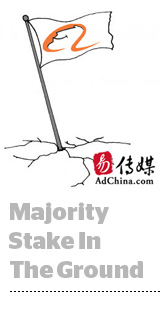 China is a market on the programmatic verge – Magna predicts that China and Japan will surpass the UK programmatic ad market by 2017 – and Alibaba seems more than ready to embrace it.
China is a market on the programmatic verge – Magna predicts that China and Japan will surpass the UK programmatic ad market by 2017 – and Alibaba seems more than ready to embrace it.
The Chinese ecommerce giant revealed Wednesday that it’s become a majority shareholder in AdChina, a Shanghai-based digital ad platform that combines supply- and demand-side functionality with a mobile DMP and digital marketing and branding capabilities.
Specifics around the deal, including the size of Alibaba’s investment, were not disclosed.
Founded in 2007, AdChina is no stranger to funding. In 2008, it raised $6 million, followed by a second round of $18.5 million the next year and $40 million in 2010. The company flirted with filing for a $100 million IPO in 2012, although the idea was ultimately abandoned.
AdChina will reportedly be working with Alimama, Alibaba’s online marketing platform, and its cloud computing unit, Aliyun, to help Alibaba take better advantage of its data – and Alibaba certainly has access to a lot of data, everything from rich transactional information to the data gleaned from billions of daily media impressions.
Alibaba’s interest in AdChina appears to be in the potentially advantageous connection between its DMP and AdChina’s marketing platform. In a very Amazon-like move, Alibaba has been working to monetize its shopper intent and transactional data through marketing services and display advertising.
There are three major businesses that make up the Alibaba Group: Taobao, a customer-to-customer ecommerce marketplace along the lines of eBay; Tmall.com, a B2C platform that functions like Amazon; and Alipay, effectively the PayPal of China.
Taobao’s affiliate network was merged with Alimama in 2008 to create the Taobao Ad Network and Exchange (TANX), which – as Alibaba phrased it in the company’s IPO filing in May – ”enables more transparent pricing of advertising inventory, which improves online marketers’ return on investment. Participants on TANX include publishers, merchants, demand-side platforms and third-party data and technology companies.”
Seems like Alibaba has it all covered. Why, then, does it really need AdChina? The answer could be as simple as expediency.
“It sounds like AdChina will give Alibaba access to more inventory sources – and they also probably also come with some clients as well, which is always nice,” Forrester senior analyst Richard Joyce told AdExchanger. “Alibaba could have just built all of those relationships from the ground up and plugged into all of those inventory sources with Alimama, but it seems like Alibaba is saying, ‘Let’s just get it all done right now.’ They certainly have the capital to do it.”
The move feels analogous to something Amazon or Google might do, Joyce said, noting that the AdChina deal reminded him of Google’s acquisition of the DoubleClick ad exchange.
But the supply side is a completely different animal in China versus the US.
“Historically, Chinese publishers didn’t want other businesses to touch their ad inventory, not to mention their data,” AdChina CEO Alan Yan told AdExchanger in a previous interview. “And because of that, the supply side in China was highly fragmented until just a few years ago.”
AdChina, however, has already put the work into tackling that fragmentation, making it an attractive acquisition target for Alibaba.
“You could see it that way,” Joyce said. “If Alibaba has the ability to consolidate all of these different publishers, then they can just start collecting, or at least seeing, that data. It’s similar to something a Google might do, or any of the exchanges or DSPs for that matter.”













